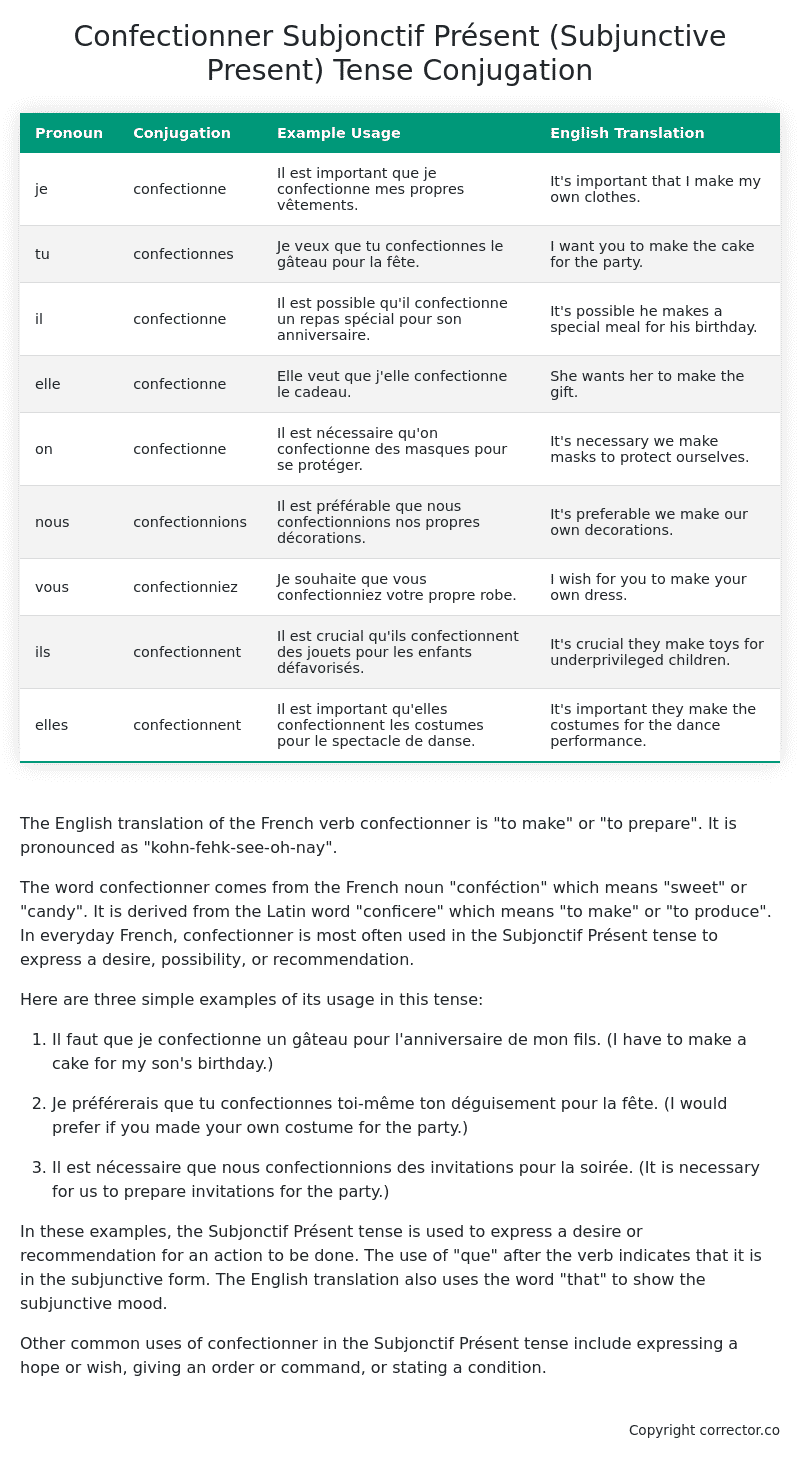Subjonctif Présent (Subjunctive Present) Tense Conjugation of the French Verb confectionner
Introduction to the verb confectionner
The English translation of the French verb confectionner is “to make” or “to prepare”. It is pronounced as “kohn-fehk-see-oh-nay”.
The word confectionner comes from the French noun “conféction” which means “sweet” or “candy”. It is derived from the Latin word “conficere” which means “to make” or “to produce”. In everyday French, confectionner is most often used in the Subjonctif Présent tense to express a desire, possibility, or recommendation.
Here are three simple examples of its usage in this tense:
-
Il faut que je confectionne un gâteau pour l’anniversaire de mon fils. (I have to make a cake for my son’s birthday.)
-
Je préférerais que tu confectionnes toi-même ton déguisement pour la fête. (I would prefer if you made your own costume for the party.)
-
Il est nécessaire que nous confectionnions des invitations pour la soirée. (It is necessary for us to prepare invitations for the party.)
In these examples, the Subjonctif Présent tense is used to express a desire or recommendation for an action to be done. The use of “que” after the verb indicates that it is in the subjunctive form. The English translation also uses the word “that” to show the subjunctive mood.
Other common uses of confectionner in the Subjonctif Présent tense include expressing a hope or wish, giving an order or command, or stating a condition.
Table of the Subjonctif Présent (Subjunctive Present) Tense Conjugation of confectionner
| Pronoun | Conjugation | Example Usage | English Translation |
|---|---|---|---|
| je | confectionne | Il est important que je confectionne mes propres vêtements. | It’s important that I make my own clothes. |
| tu | confectionnes | Je veux que tu confectionnes le gâteau pour la fête. | I want you to make the cake for the party. |
| il | confectionne | Il est possible qu’il confectionne un repas spécial pour son anniversaire. | It’s possible he makes a special meal for his birthday. |
| elle | confectionne | Elle veut que j’elle confectionne le cadeau. | She wants her to make the gift. |
| on | confectionne | Il est nécessaire qu’on confectionne des masques pour se protéger. | It’s necessary we make masks to protect ourselves. |
| nous | confectionnions | Il est préférable que nous confectionnions nos propres décorations. | It’s preferable we make our own decorations. |
| vous | confectionniez | Je souhaite que vous confectionniez votre propre robe. | I wish for you to make your own dress. |
| ils | confectionnent | Il est crucial qu’ils confectionnent des jouets pour les enfants défavorisés. | It’s crucial they make toys for underprivileged children. |
| elles | confectionnent | Il est important qu’elles confectionnent les costumes pour le spectacle de danse. | It’s important they make the costumes for the dance performance. |
Other Conjugations for Confectionner.
Le Present (Present Tense) Conjugation of the French Verb confectionner
Imparfait (Imperfect) Tense Conjugation of the French Verb confectionner
Passé Simple (Simple Past) Tense Conjugation of the French Verb confectionner
Passé Composé (Present Perfect) Tense Conjugation of the French Verb confectionner
Futur Simple (Simple Future) Tense Conjugation of the French Verb confectionner
Futur Proche (Near Future) Tense Conjugation of the French Verb confectionner
Plus-que-parfait (Pluperfect) Tense Conjugation of the French Verb confectionner
Passé Antérieur (Past Anterior) Tense Conjugation of the French Verb confectionner
Futur Antérieur (Future Anterior) Tense Conjugation of the French Verb confectionner
Subjonctif Présent (Subjunctive Present) Tense Conjugation of the French Verb confectionner (this article)
Subjonctif Passé (Subjunctive Past) Tense Conjugation of the French Verb confectionner
Subjonctif Imparfait (Subjunctive Imperfect) Tense Conjugation of the French Verb confectionner
Conditionnel Présent (Conditional Present) Tense Conjugation of the French Verb confectionner
Conditionnel Passé (Conditional Past) Tense Conjugation of the French Verb confectionner
L’impératif Présent (Imperative Present) Tense Conjugation of the French Verb confectionner
L’infinitif Présent (Infinitive Present) Tense Conjugation of the French Verb confectionner
Struggling with French verbs or the language in general? Why not use our free French Grammar Checker – no registration required!
Get a FREE Download Study Sheet of this Conjugation 🔥
Simply right click the image below, click “save image” and get your free reference for the confectionner Subjonctif Présent tense conjugation!

Confectionner – About the French Subjonctif Présent (Subjunctive Present) Tense
Formation of the Subjonctif Présent
Common Everyday Usage Patterns
Interactions with Other Tenses
Summary
I hope you enjoyed this article on the verb confectionner. Still in a learning mood? Check out another TOTALLY random French verb conjugation!


